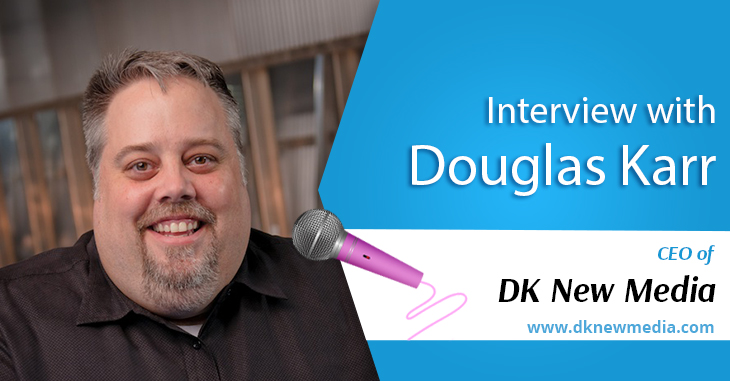
Hello Readers! In today’s interview, we had the opportunity to speak with Douglas Karr, the CEO of DK New Media, the founder of Marketing Technology Blog, and a renowned author of “Corporate Blogging for Dummies”.
Douglas is one of the leading digital marketers who has assisted businesses- Angie’s List, GoDaddy, Mindjet and much more with his expertise in social media, blogging, search engine optimization, pay per click and public relations.

In the below interview, he has shared with us his knowledge on important aspects of digital marketing and shared effective marketing tips:
Douglas: Oh the irony of this first question! I just had breakfast with a friend yesterday that said that there’s such a huge difference between me in person than online. The strange thing is that I share everything online (much to the horror of my friends). I love debating religion and politics, but I’m absolutely appreciative of other opinions. I believe in diversity of thought and belief. My friends on the right confuse me as being liberal. My friends on the left confuse me as being conservative. The truth is that I’m passionate and compassionate about helping one another. That’s something you’ll always see in the flesh and blood!
Douglas: Part of my passion for business and marketing is that the Internet has provided a means for every person to learn, share, and become an entrepreneur. The Internet doesn’t care what race you are, what religion you are, what country you’re in… if you have a great idea, you will find like-minded people to build, share, or buy that idea. I waited until I was 40 years old before stepping out on my own and it’s the best decision I ever made professionally.
Douglas: Intent is measured through attention, engagement and conversion. Your method of identifying the content that feeds user intent depends on your budget and timeline. If you have a solid budget and short timeline, pay-per-click marketing is an ideal means of testing your messaging, calls-to-action and your offer. PPC can unlock all the secrets, but it comes at a price! However, it’s a solid investment because now you can better focus your organic content and social promotion efforts around the terms that are feeding the intent of your visitors. If you don’t have strong budgets, this is done by creating a topical hierarchy, researching each topic, and writing content that’s superior than the competition. Over time, you’ll see what gravitates with the audience and you can slowly change focus into that area. The content that does not engage and the PPC that doesn’t pay off is not a loss, though! Too many marketing professionals believe they need to narrowly focus all their efforts. The problem is that other topics may not engage and convert, but they may drive trust and authority.
Douglas: Hard niches are honestly my favorite and much easier than wider topics. We had a healthcare technology client that built portals for employers to distribute and communicate health benefits to their employees. Rather than write about portals all day, we developed a strategy where they would disseminate national trend data once a quarter on employee healthcare costs for employers. After a couple years, they owned the market because they were seen as a trusted source with their finger on the pulse of the challenges that employers were running into. The content helped their clients become more successful.
Douglas: Webmaster data, rankings, and site audits don’t just focus on search, they often focus on issues that impact your users. We see a lot of clients who lose significant ranking after hiring a new firm to redesign their site. The problem is that all the referring sites now point to non-existent pages because the agency didn’t audit the site and implement redirects. That’s not simply a search issue, that’s a user interaction issue as well. Report automation, conversion funnels, user behavior dashboards, event tracking, and campaign tracking are all features of analytics… but we rarely see them utilized when clients hire us. You can’t improve what you don’t measure. I’d recommend every company use Bing and Google Webmasters, Google Analytics, SEMRush or SpyFu, as well as a solid SEO platform that monitors both search and off-site impact like social. gShift is one such platform.
Douglas: I’ll be honest that I don’t place too much faith in SEO consultants. There are a handful that I respect, but it’s not because of their search engine knowledge… it’s because of their marketing knowledge. Understanding user behavior, omnichannel strategies, and brand marketing are all essential to SEO. I’ll put it a different way. If you had $100,000 to hire an SEO consultant, I would rather you spend that money on branding, messaging, premiere content, and promotion of that content. $100,000 in content will get you more results than $100,000 in SEO consulting any day. The exception, of course, is that you already have your branding, content, and conversion optimization tuned in… but aren’t seeing good results from search engines. That’s when it’s time to hire the SEO consultant.
Douglas: Really only 2 major changes:
1.) The role of sales and marketing are converging. Marketers need to understand and provide collateral for sales to be effective. Sales needs to understand the marketing positioning and provide feedback to Marketers to ensure their success. I especially love organizations that have merged the two and are run by a CRO (Chief Revenue Officer). No more pointing fingers for crappy leads, or rogue sales people. Both answer to the CRO!
2.) Buying behavior continues to push the moment of truth before the prospect ever engages with your sales team. Buyers are researching every aspect of a purchase decision nowadays. They know your competition, they understand your pricing, and they already know the benefits and shortcomings of your products and services. How? They researched online. If you’re not where your buyers are researching, you’re in trouble.
I love that digital marketers have retreated from looking for the next big thing and figured out that marketing and a lot of effort are what will pay off in the long run. In a sense, it’s nothing new. We’re returning to the roots of marketing.
Douglas: Sociology and human behavior. Digital opened a world to technology experts (like myself) that thought since they could design a web page, they could open an agency and become a marketing professional. While there are a lot of folks like that out there, very few actually understand consumer behavior. If you’re a digital marketer today, I’d highly recommend you focus your attention on brand and product marketing as well as sales strategies. When you fully understand the motivation of your buyers, your output won’t be HTML5, it will be an engaging tool that communicates the benefits of your products or services to meet all the needs of your buyers.
Douglas: The strategy that continues to drive results for our own publication and for our clients is simple. Stop producing endless content and begin to envision your web presence as a library. What books would you have on your shelves? How would you organize your books? How would you inform people on how to find the books they’re looking for? Now replace books with articles, infographics, videos, case studies, ebooks and white papers. Replace organize with navigation, hierarchy, and titles. Replace your librarian and index cards with omnichannel organic and paid promotion strategies. It’s not how many posts per week you’re producing that will drive engagement and conversions. It’s whether or not you have all the content that you need and if that content is superior to your competitions’ content.
**********************************************************************
We really thank Douglas Karr for sparing some time from his busy schedule for this interview session.
We hope you all liked this interview and the tips shared by Douglas Karr will surely help you to grow your business successfully.
Please share your thoughts about this interview in the comment section.
Stay tuned with us for more informative interviews.
You can also read the interesting interviews of other influencers of the digital marketing world here.

Started working as a digital marketing expert, Varun Sharma is now also a well-known digital marketing speaker – a speaker on performance development, and a trusted mentor to businesses in the digital world. His keynote expositions are based on the digital marketing theories, which provide a fascinating insight into the secrets of high performance.

